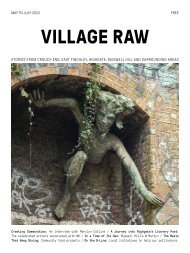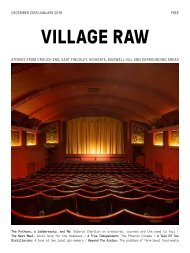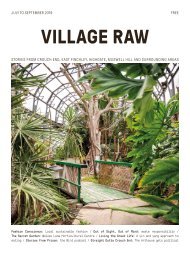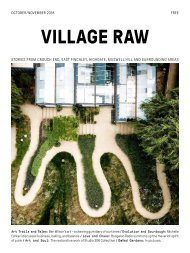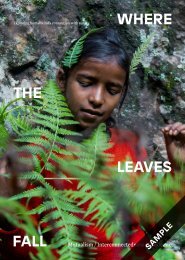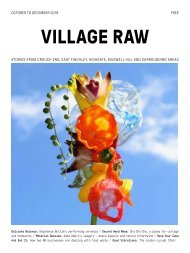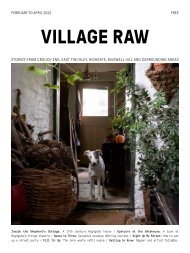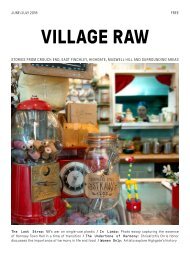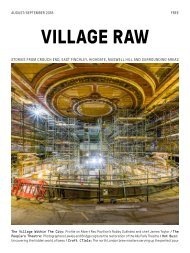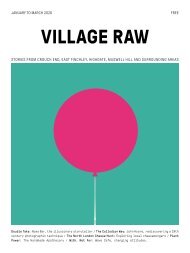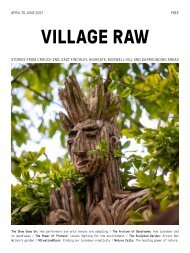Village Raw - ISSUE 6
Village Raw is a magazine that explores cultural stories from Crouch End, East Finchley, Highgate, Muswell Hill and the surrounding areas. The magazine is created by the community, for the community. If you like this issue you can support the project through a subscription or donation. See the links below. The sixth issue of Village Raw magazine includes: ARTISTS OPEN UP - The Crouch End and East Finchley open studios. FUZZY AND LOUD / LO-FI AND MOODY - Musician Michael Jablonka discusses his music. ON THE TRAIL OF PINK - A project to celebrate Highgate’s historical women. LIGHTING IT UP - The Bounds Green Window Show lighting up the neighbourhood. WARM HUGS AND SWEET MEMORIES - In celebration of Crouch End institution Edith’s House. THE STATE OF OUR HIGH STREETS - Keeping our high streets alive and healthy. DINNER WITH A DIFFERENCE - Exploring the local supper club scene. THINKING LOCAL TO ACT GLOBAL - Making our relationship with the environment more reciprocal. SHAPING THE WORLD AROUND US - The importance of our biodiversity. FLOWERS FROM SEED - Growing seasonal local flowers for sustainable bouquets. FUELLING MIND AND BODY - A sanctuary to escape the pressures of modern life. AND MORE… Village Raw is created by the community, for the community. If you like this issue you can support the project through a subscription or donation. See the links below.
Village Raw is a magazine that explores cultural stories from Crouch End, East Finchley, Highgate, Muswell Hill and the surrounding areas. The magazine is created by the community, for the community. If you like this issue you can support the project through a subscription or donation. See the links below. The sixth issue of Village Raw magazine includes:
ARTISTS OPEN UP - The Crouch End and East Finchley open studios.
FUZZY AND LOUD / LO-FI AND MOODY - Musician Michael Jablonka discusses his music.
ON THE TRAIL OF PINK - A project to celebrate Highgate’s historical women.
LIGHTING IT UP - The Bounds Green Window Show lighting up the neighbourhood.
WARM HUGS AND SWEET MEMORIES - In celebration of Crouch End institution Edith’s House.
THE STATE OF OUR HIGH STREETS - Keeping our high streets alive and healthy.
DINNER WITH A DIFFERENCE - Exploring the local supper club scene.
THINKING LOCAL TO ACT GLOBAL - Making our relationship with the environment more reciprocal.
SHAPING THE WORLD AROUND US - The importance of our biodiversity.
FLOWERS FROM SEED - Growing seasonal local flowers for sustainable bouquets.
FUELLING MIND AND BODY - A sanctuary to escape the pressures of modern life.
AND MORE…
Village Raw is created by the community, for the community. If you like this issue you can support the project through a subscription or donation. See the links below.
Create successful ePaper yourself
Turn your PDF publications into a flip-book with our unique Google optimized e-Paper software.
VILLAGE RAW<br />
SUSTAINABLE VILLAGE<br />
SHAPING<br />
THE WORLD<br />
AROUND US<br />
We are in a geological<br />
epoch defined by human<br />
impact - the Anthropocene.<br />
What we do with that<br />
knowledge will shape<br />
the world for ever.<br />
Words and photos by Chris King.<br />
I listen intently to Ed Santry, the new Nature Conservation Officer<br />
for Haringey Council, as he gives a talk on the latest Biodiversity<br />
Action Plan (BAP) he’s working on for the borough. His audience<br />
are members of the Friends of Alexandra Park, a volunteer group<br />
which plays a vital role in maintaining and monitoring the plants<br />
and animals within the park - one of many such groups in the area.<br />
He stresses how conserving those green spaces, and the<br />
corridors between them, is vital to maintaining biodiversity within<br />
the borough, and it will be one of the priorities of the new BAP.<br />
After he finishes talking about Haringey’s new plan, Ed tells<br />
me that one of the key challenges to creating positive change is<br />
the need to raise awareness of the impact we are having on biodiversity<br />
in all aspects of our lives and society. That means not just<br />
across the council and government departments, or the boardrooms<br />
and offices of corporations, but also within the household.<br />
Over 25 years ago that awareness actually existed, with an<br />
acknowledgement by governments, scientists, and the wider<br />
public alike, of the need for swift, meaningful action to be taken,<br />
at a national and global level, to address the issue of biodiversity<br />
loss. There was seemingly a political will to do exactly that…<br />
In 1992 over 150 heads of state, and thousands of other delegates<br />
from across the globe, descended upon a sunny Rio de<br />
Janeiro. They were there to participate in the UN’s Conference<br />
on Environment and Development (UNCED), more widely known<br />
as the Earth Summit, motivated by increasing scientific evidence<br />
highlighting the impact of human activities on the environment.<br />
The gathering was unprecedented in its size and political<br />
support. Never before had so many heads of state attended a<br />
convention, never before had the environment been given such a<br />
high priority within the global political agenda. As the UK government<br />
would later declare, there was a “shared belief that action<br />
must be taken to halt the worldwide loss of animal and plant species<br />
and genetic resources”.<br />
At the convention, Prime Minister John Major signed the<br />
Convention on Biological Diversity (CBD), the first treaty to provide<br />
a legally binding framework for biodiversity conservation. It<br />
calls on the signatories to establish and enforce national strategies<br />
that ensure the conservation and sustainable use of biological<br />
diversity.<br />
Two years later, the UK published its Biodiversity Action Plan,<br />
to tackle biodiversity loss at a national level - the first country to<br />
do so. The plan set out to “conserve and enhance biological diversity<br />
within the UK and to contribute to the conservation of global<br />
biodiversity through all appropriate mechanisms”.<br />
Despite this, we are now in the midst of a sixth mass extinction.<br />
Not caused by an asteroid collision, or a volcanic eruption shrouding<br />
the sky in ash, but by our actions. We have managed to wipe out<br />
60% of mammals, birds, reptiles and fish since 1970, and over 40%<br />
of insect species are declining and are under threat of extinction.<br />
The UN’s latest Global Biodiversity Outlook report states that<br />
33<br />
drivers linked to agriculture account for “70% of the projected<br />
loss of terrestrial biodiversity”. The UK itself has lost 54% of its<br />
species of farmland birds since 1970. Examples of species in decline,<br />
near extinction or becoming extinct over the past few decades,<br />
within the UK and beyond, are numerous.<br />
It’s clear the legislation that has existed to date, at all levels<br />
of government, and both nationally and globally, has failed to<br />
counter the impacts of our ever-growing industrialised societies.<br />
Until we start to value the life around us more, engage in helping<br />
preserve it and nurture it, and become more conscious of the<br />
interconnectedness of all things, then the situation is only going<br />
to get worse - spelling disaster for those plants and animals that<br />
still remain, including for us.<br />
While individual responsibility is undoubtedly important, and<br />
we should inform ourselves and do all we can to minimise our own<br />
impact, this alone is not enough - we must also engage with our<br />
politicians. It is they who can introduce legislation that can have<br />
a meaningful impact in a short timeframe on issues such as pesticide<br />
use and air pollution, if the political will is there.<br />
It’s been proven time and again, that when an issue moves<br />
up the public agenda, it also moves up the political agenda. We<br />
must therefore work individually and collectively to ensure the<br />
protection of biodiversity is at the top of our government’s agenda,<br />
much like it was in 1992, and to do all we can to keep it there,<br />
lest history repeat itself. •<br />
This page: Ed Santry, the new Nature Conservation<br />
Officer for Hanringey Council.<br />
You can find out how to contact your local MP, as well as members of All-Party Groups<br />
and Select Committees, by visiting: www.parliament.uk/get-involved/contact-your-mp<br />
To help with the conservation projects in your area, visit your borough’s website and<br />
search for “conservation groups” or “get involved”.



